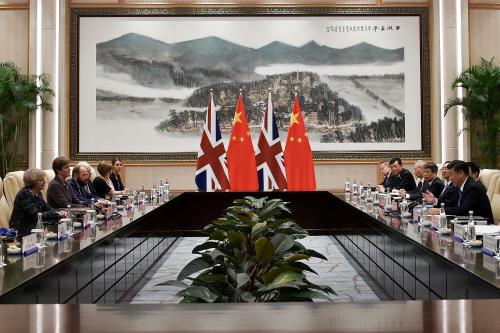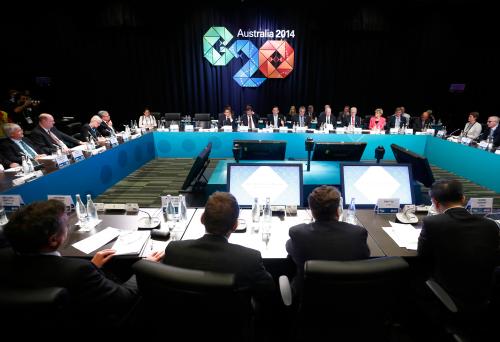The year of public angst
2016 has been a tumultuous year for the world. After the successful conclusion of the climate change agreement in Paris in December of last year, and the endorsement of the Sustainable Development Goals (SDGs) for 2030 by all members of the United Nations that September, there was a tectonic plate shift in the domestic politics of advanced countries. Terrorist attacks in Paris, Brussels, Nice, and Istanbul put Europe on edge. The rise of the Independent Party in the United Kingdom, the National Front in France, and Action for Germany as answers to underlying social and economic discontent is mirrored by the rise of Donald Trump in the United States. Then, on June 23, the referendum on whether the U.K. would remain or leave the European Union stunned everyone with its result.
The G-20 summit in Hangzhou, China last weekend was the first global meeting this year of leaders in the wake of this cumulative evidence of public angst over the failure of market economies to generate inclusive social outcomes and the failure of democracies to generate responsive political leadership. It was an opportunity for leaders to guide, develop, and communicate policies to reassure people that technology and globalization would deliver more opportunities for prosperity. The question for the summit was: Do the systemically important countries have an answer to the public angst in the face of what might now be called “systemic crises” on multiple fronts?
The China G-20 drive for distinction
China has been preparing for the Hangzhou G-20 summit for the better part of two years, and one priority was to endorse, link, and develop implementation proposals for the sustainable development agenda for 2030 and the Paris Agreement on climate change. In the course of these preparations, it became clear that accelerated investment in infrastructure could be a powerful nexus joining short-term economic stimulus on the demand side to longer-term contributions to growth on the supply side, meeting social and environmental goals at the same time. This was potentially the sweet spot for the China G-20 focus, which could have emphasized people-centered and planet-centered leadership rather than policy lingo aimed at financial markets, corporations, and the wealthy. This combination of policy thrusts could have constituted a political answer to public anxieties. China seemed ready to put it forward.
The results: Awkward patching of contrary forces
2016 may have been the year that teed up the need for new direction, fresh initiatives, and strong leadership, but the contrary interests of G-20 member countries seem to have missed this opportunity at Hangzhou. Whereas some of the key words for an ambitious transformative approach are in the Hangzhou G-20 communiqué, there is evidence of avoiding commitments, ducking the big ideas, and mouthing the right words but dodging the verbs and adjectives that contained ambition.
There is substantial evidence of avoiding commitments and downplaying the central ideas of a more powerful articulation of a forward-looking vision to achieve sustainability and better lives for all in the future. Instead of concrete short-term deliverables, there are commitments to task forces and research centers.
First, there is a long paragraph on investment in infrastructure, which conveys some of the details thrashed out over many months in multiple forums on how to scale up investment infrastructure “from billions to trillions” as a central instrument for achieving social, environmental, and economic development in an integrated fashion. But that paragraph is not in the main economic growth section of the communiqué but in the development section. A “new era of growth and sustainable development” is declared early on in the communique, but the pledge is conditioned by “taking into account the Agenda for Sustainable Development, the Addis Action Agenda and the Paris Agreement.” “Taking into account” is a weak phrase intended to avoid commitment rather than embrace it.
Second, whereas there is wording about the universal nature of Agenda 2030 and sharing the spirit of its ambition, the G-20 pledges “bold, transformative collective actions in a wide range of areas” …”to commit to contributions to the implementation of the 2030 Agenda.” This avoids committing to domestic actions to implement A2030 as a whole, while repeating promises already made elsewhere on development cooperation. In fact, the SDGs are not mentioned anywhere in the Hangzhou communique. So, except for those in the know, the G-20 served no useful purpose in educating the public about what “sustainability” by 2030 means. Nowhere is there an effort to describe what “sustainable development” now means and to promote the idea that the spillover effects of policies in the largest world economies are the main drivers of development for the rest of the world. The fact is that an integrated agenda for transformative change that will be needed to achieve sustainability by 2030 is nowhere articulated.
Fractious fissures within the G-20; The West turns its back on the public angst
This is not because the Chinese hosts did not understand these nuances, nor that they did not want to advance them. It seems plausible that China would have gone further if they could have gotten consensus within the group. But it seems that the advanced countries, where the public angst is the most palpable, were not willing to commit to a longer term collective vision of achieving sustainability. They seem to want to keep generating a mélange of policy work streams for governments that could slowly build the necessary architecture of norms, regulations, and institutions for a new global economy, but without conveying a sense of urgency or of change in the way that the benefits of globalization will be delivered. Leaders like President Obama were reduced to arguing that the importance of the G-20 should be weighed by looking at overall improvements in the global economy since the 2008 financial crisis, and by the slow and often painful progress in establishing new global norms. But these new norms do not in themselves provide an answer to the public angst that people are feeling and expressing. It was as if 2016 were an ordinary year; 2016 seems to be, in this perspective, the year for leadership that wasn’t.







Commentary
2016: The year for leadership that wasn’t for the China G-20
September 6, 2016